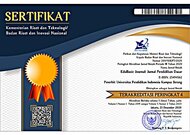The Impact of Online and Offline Learning on Social Development of Early Childhood in The Covid-19 Pandemic
Abstract
In the Covid-19 pandemic, children's social skills are underdeveloped. It happens because the learning system requires children no longer to interact with peers. Thus, they tend to play alone by using a cellphone and not looking for friends to play with and learn together. For this reason, this study aimed to determine the impact of online and offline learning on the social development of early childhood during the Covid-19 pandemic at the Pembina Lengayang State Kindergarten. This type of research used descriptive quantitative methods. The sampling technique used was the cluster sampling technique, namely the area sampling technique for determining the sample if the area to be studied was very large. Data were collected using observation, interviews, and documentation and analyzed using descriptive statistics with the help of SPSS for Windows 23. Based on the frequency test results through SPSS 23, out of 15 children, 14 children were classified as not good (93.3%), and one child was classified as good (6.7%). Meanwhile, the offline learning results revealed that out of 15 children, 100% of children were in the classification as not good social development. Then, there was no significant difference between the children's social development results through online and offline learning in the significance test. From the t-test or hypothesis testing results, it was found that the value of sig 2-tailed on children's social development both online and offline was < 0.05. It indicates that Ha1 and Ha2 were accepted. In other words, there was an impact of online and offline learning on the social development of children at the Pembina Lengayang State Kindergarten.
Keywords
Full Text:
PDFReferences
Afif, N., & Qowwim, A. N. (2021). Optimalisasi Pembelajaran anak usia dini di masa pendemi covid-19. El-Athfal : Jurnal Kajian Ilmu Pendidikan Anak, 1(2), 57–63.
Antara, A., & Prima, E. (2020). Pembelajaran daring pengaruhi jiwa anak, perlu antisipasi cepat. Tekno, Tempo.Co [Online].
Damayanti, E., Nurhasanah, N., Nurafia, N., & Kamal, E. E. (2019). Deteksi dini pencapaian perkembangan anak usia 2-3 tahun berdasarkan standar nasional pendidikan anak usia dini. NANAEKE: Indonesian Journal of Early Childhood Education, 2(1), 10–24.
Handayani, F. F., Hibana, H., & Surahman, S. (2021). Implementasi pembelajaran daring dan luring bagi anak usia dini pada masa pendemi covid-19. Mitra Ash-Shibyan: Jurnal Pendidikan dan Konseling, 4(2), 103–116.
Harahap, S., Dimyati, D., & Purwanta, E. (2021). Problematika pembelajaran daring dan luring anak usia dini bagi guru dan orang tua di masa pandemi covid 19. Jurnal Obsesi: Jurnal Pendidikan Anak Usia Dini, 5(2), 1825–1836.
Hardiyanti, W. E., Sulkifly, S., & Tuasikal, J. M. S. (2021). Kesiapan penerapan pembelajaran aktif, kreatif dan menyenangkan bagi anak usia dini di era new normal. Student Journal of Early Childhood Education, 1(1) 1–10.
Hijriati, H. (2019). Faktor dan kondisi yang mempengaruhi perkembangan sosial emosional anak usia dini. Bunayya: Jurnal Pendidikan Anak, 5(2), 94–102.
Kusuma, W. S., & Sutapa, P. (2021). Dampak pembelajaran daring terhadap perilaku sosial emosional anak. Jurnal Obsesi: Jurnal Pendidikan Anak Usia Dini, 5(2), 1635–1643.
Mayar, F. (2013). Perkembangan sosial anak usia dini sebagai bibit untuk masa depan bangsa. Al-Ta’lim Journal, 20(3), 459–465.
Mulyana, A. (2020). Pelaksanaan pembelajaran daring dan luring dengan metode bimbingan berkelanjutan pada guru di sekolah dasar di Teluk Betung Utara Bandar Lampung. Pedagogia: Jurnal Ilmiah Pendidikan Dasar Indonesia, 2(1), 67–76.
Nofrika, D. S., & Eliza, D. (2021). Perkembangan sosial anak usia dini di masa pandemi covid-19. Jurnal Pendidikan Tambusai, 5(3), 9610–9613.
Srihartini, Y., & Lestari, M. P. (2021). Pembelajaran pendidikan anak usia dini online di era pendemi covid-19. Tarbiatuna: Journal of Islamic Education Studies, 1(1), 135–154.
Umayah, U. (2017). Perkembangan sosial pada anak usia dini. As-Sibyan: Jurnal Pendidikan Anak Usia Dini, 2(1), 85–96.
Veronica, N. (2018). Permainan edukatif dan perkembangan kognitif anak usia dini. PEDAGOGI: Jurnal Anak Usia Dini dan Pendidikan Anak Usia Dini, 4(2), 49–55.
Wulandari, H., & Purwanta, E. (2020). Pencapaian perkembangan anak usia dini di taman kanak-kanak selama pembelajaran daring di masa pendemi covid-19. Jurnal Obsesi: Jurnal Pendidikan Anak Usia Dini, 5(1), 452–462.
DOI: https://doi.org/10.17509/ebj.v4i1.38196
Refbacks
- There are currently no refbacks.
Copyright (c) 2022 Universitas Pendidikan Indonesia
This work is licensed under a Creative Commons Attribution 4.0 International License.
This journal is indexed by




.png)




.png)
1.png)


1.png)

.png)